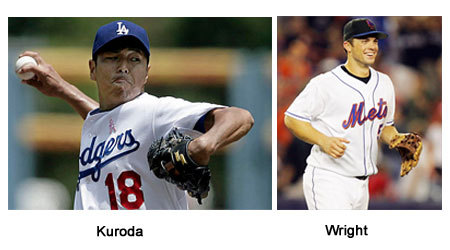Baseball Headaches for Hiroki Kuroda and David Wright

It was a scary day in baseball yesterday - two players were hit in the head by baseballs. Hiroki Kuroda, pitcher for the LA Dodgers was hit above the right ear by a line drive by Arizona Diamondbacks’ Rusty Ryal. Although he did not lose consciousness, he laid stunned on the mound for quite a while. After a neck brace was placed, Kuroda was taken by ambulance to St. Joseph’s Hospital. CT scan was negative for fracture and bleeding, and he was admitted for overnight observation for a concussion.
Meanwhile, in New York, Mets third baseman, David Wright was hit in the head with a pitched ball clocked at 94 mph from Giant pitcher Matt Cain. He lay motionless on his stomach for more than a minute before trainers helped turn him onto his back. Like Kurda, he was taken by ambulance to the hospital, had a negative CT scan, diagnosed with a concussion, and was kept overnight for observation.
Major League Baseball has recently introduced a new batters helmet that can withstand impacts up to 100 mph but the helmet, the Rawlings S100, is drawing resistance from some players.
What is a concussion?
The brain normally floats inside the skull, surrounded by spinal fluid. The brain has a consistency somewhat like jello, and although somewhat protected by the skull, is not completely protected by the impact of a violent force. Rapid changes in head movement, such a significant blow to the head, can cause the brain to hit against the inner wall of the skull, causing injury to the delicate brain tissue. There is also a chance that blood vessels in the brain can be torn, leading to bleeding in or around the brain.
Concussion is a very common problem, with over 1 million concussions occurring in the US each year. Many occur as sports injuries. Symptoms can range from mild to severe. They can include headache, loss of consciousness, and memory loss (amnesia) of events surrounding the injury. Many concussions do not involve loss of consciousness, but victims may appear shocked or stunned or a short period of time. Symptoms of a more serious head injury include:
- Changed level of alertness (drowsy, hard to arouse, or similar changes)
- Seizures (convulsions)
- Muscle weakness on one or both sides
- Continued confusion
- Persistent unconsciousness (coma)
- Repeated vomiting
- Unequal pupils
- Unusual eye movements
- Walking problems
- Ear ringing
- Impaired balance
The presence of these symptoms requires evaluation by a physician. For mild concussions, treatment is rest, mild analgesics, and observation.
For more information:
























0 comments